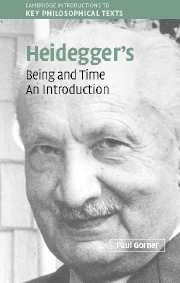5 - Being-in
Published online by Cambridge University Press: 05 June 2012
Summary
DISCLOSEDNESS
The impression might have been given that being-in-the-world is simply a matter of dealing with equipment. This can hardly be the case given that being-in-the-world is what is supposed to make any comportment to entities possible. In the Kantian language Heidegger favours, being-in-the-world is a condition of the possibility of comportment to entities as entities. He also comes to identify being-in-the-world with what he calls transcendence. The being of Dasein is transcendence is the sense that Dasein is a going beyond or transcending of what is (Seiendes) to being (Sein). It is in thus transcending entities that Dasein is able to comport itself to entities as entities.
That being-in-the-world is not simply a matter of dealing with equipment becomes clear when we turn to his analysis of being-in. We already know what it is not. But our knowledge of what it is is partial and incomplete. Concern (Besorgen) – engaged having-to-do-with equipment – is at most a way of being-in-the-world. But what being-in-the-world essentially is, is what Heidegger calls disclosedness (Erschlossenheit). Concern is a form of disclosedness in the sense that in our engagement with things, things are disclosed. But it is also a form of disclosedness of Dasein in the sense that Dasein discloses itself to itself in its engagement with things. For reasons of clarity, Heidegger uses the terms ‘uncover’ or ‘dis-cover’ (Entdecken) and uncoveredness or dis-coveredness (Entdecktheit) for the disclosing and disclosedness of entities other than Dasein.
- Type
- Chapter
- Information
- Heidegger's Being and TimeAn Introduction, pp. 70 - 93Publisher: Cambridge University PressPrint publication year: 2007

